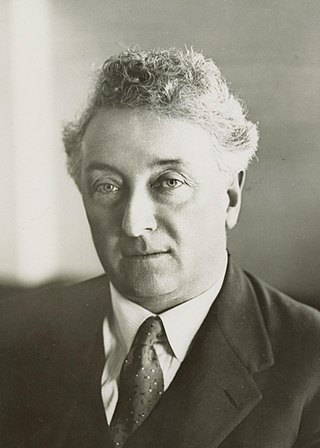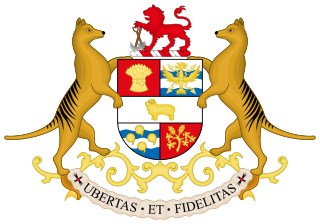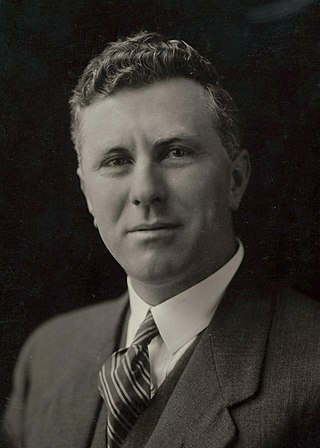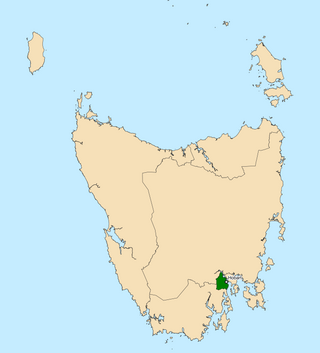
Joseph Aloysius Lyons was an Australian politician who served as the tenth prime minister of Australia, from 1932 until his death in 1939. He held office as the inaugural leader of the United Australia Party (UAP), having previously led the Tasmanian branch of the Australian Labor Party (ALP) before the Australian Labor Party split of 1931. He served as the 26th premier of Tasmania from 1923 to 1928.

The House of Assembly, or Lower House, is one of the two chambers of the Parliament of Tasmania in Australia. The other is the Legislative Council or Upper House. It sits in Parliament House in the state capital, Hobart.

The Parliament of Tasmania is the bicameral legislature of the Australian state of Tasmania. It follows a Westminster-derived parliamentary system and consists of the governor of Tasmania, the Legislative Council, and the House of Assembly. Since 1841, the Legislative Council has met in Parliament House, Hobart, with the House of Assembly following suit from its establishment in 1856. The Parliament of Tasmania first met in 1856.
The Division of Bass is an Australian electoral division in Tasmania.

The Division of Denison was an Australian electoral division in Tasmania, before being replaced by the Division of Clark as part of a 2016–17 redistribution.
The Division of Franklin is an Australian electoral division in Tasmania.
The Division of Lyons is an Australian electoral division in Tasmania.

Donald Norman Cameron was an Australian politician. He served in the House of Representatives and Tasmanian House of Assembly.
Darwin was a surveyed and short-lived community at the eastern side of Mount Darwin on the West Coast Range.

The electoral division of Bass is one of the five electorates in the Tasmanian House of Assembly, it includes north-east Tasmania and Flinders Island. Bass takes its name from the British naval surgeon and explorer of Australia: George Bass. The division shares its name and boundaries with the federal division of Bass.

The electoral division of Lyons is one of the five electorates in the Tasmanian House of Assembly, with the largest electorate and covering most of central and eastern Tasmania. Lyons is named jointly in honour of Joseph Lyons, Prime Minister of Australia (1932–1939); Premier of Tasmania (1923–1928), and Joseph's wife, Dame Enid Lyons, the first woman elected to the Australian House of Representatives in 1943. The electorate shares its name and boundaries with the federal division of Lyons.

James Allan Guy, CBE was an Australian politician who represented the Australian Labor Party in both the Tasmanian House of Assembly and the Federal House of Representatives, before leaving to represent the United Australia Party and then the Liberal Party of Australia in both the House of Representatives and the Senate. His father, James Guy, had also been a Senator.

The 1928 Tasmanian state election was held on Wednesday, 30 May 1928 in the Australian state of Tasmania to elect 30 members of the Tasmanian House of Assembly. The election used the Hare-Clark proportional representation system — six members were elected from each of five electorates.

Herbert James Mockford Payne was an Australian politician. He served as a Senator for Tasmania from 1920 to 1938 and as a member of the Tasmanian House of Assembly from 1903 to 1920.
The electoral district of Kentish was a single-member electoral district of the Tasmanian House of Assembly. It centred on the town of Sheffield in Tasmania's north, inland from Devonport.
This is a list of members of the Tasmanian House of Assembly between the 30 May 1928 election and the 9 May 1931 election. The 1928 election failed to deliver a majority, and the Nationalists' John McPhee took over from Labor's Joseph Lyons as Premier of Tasmania. Lyons subsequently retired from state politics, obtaining election to the Federal seat of Wilmot and going on to become Prime Minister of Australia in 1931.
This is a list of electoral results for the Division of Wilmot in Australian federal elections from the division's creation in 1903 until its abolition in 1984.
The Division of Clark is an Australian Electoral Division in the state of Tasmania, first contested at the 2019 federal election.

The electoral division of Clark is one of the five electorates in the Tasmanian House of Assembly, it is located in Hobart on the western shore of the River Derwent and includes the suburbs below Mount Wellington. Clark is named after Andrew Inglis Clark, a Tasmanian jurist who was the principal author of the Australian Constitution. The electorate shares its name and boundaries with the federal division of Clark.

The Tasmanian Nationals are a political party in the Australian state of Tasmania, aligned with the National Party of Australia. The party is not currently registered with the Tasmanian Electoral Commission, and is not separately registered with the Australian Electoral Commission, unlike the other state branches of the Nationals.


















